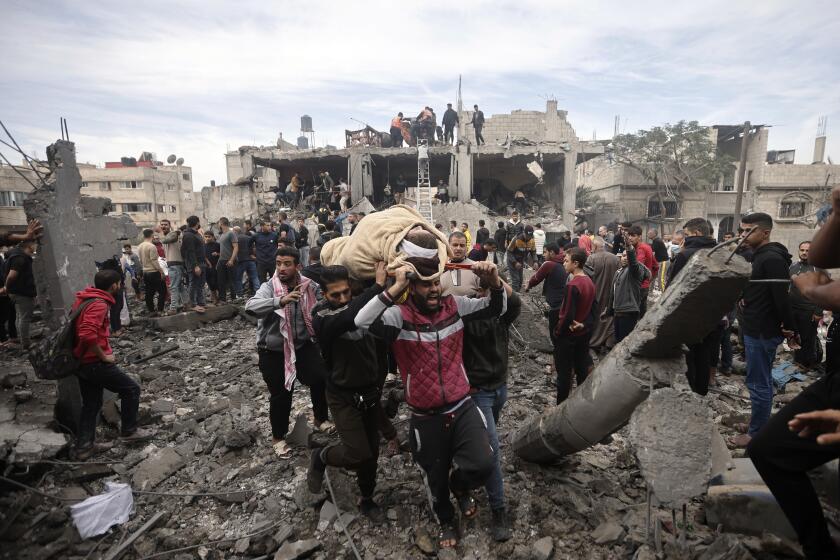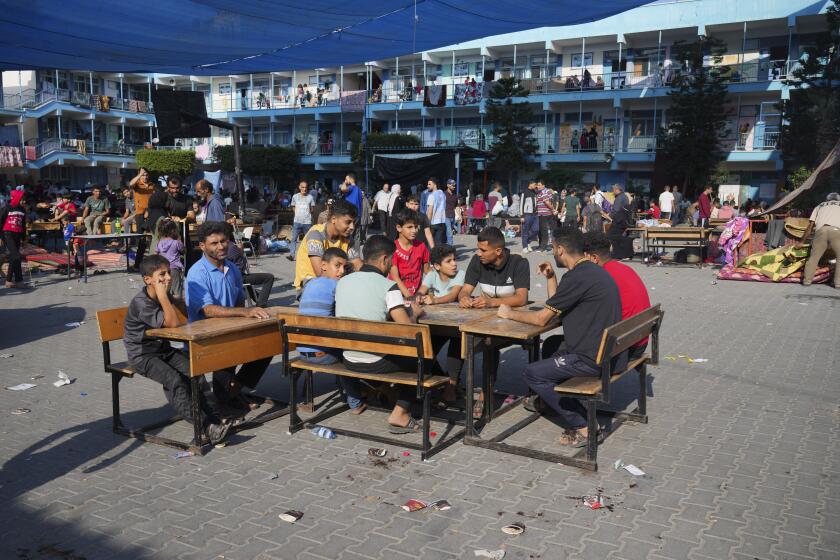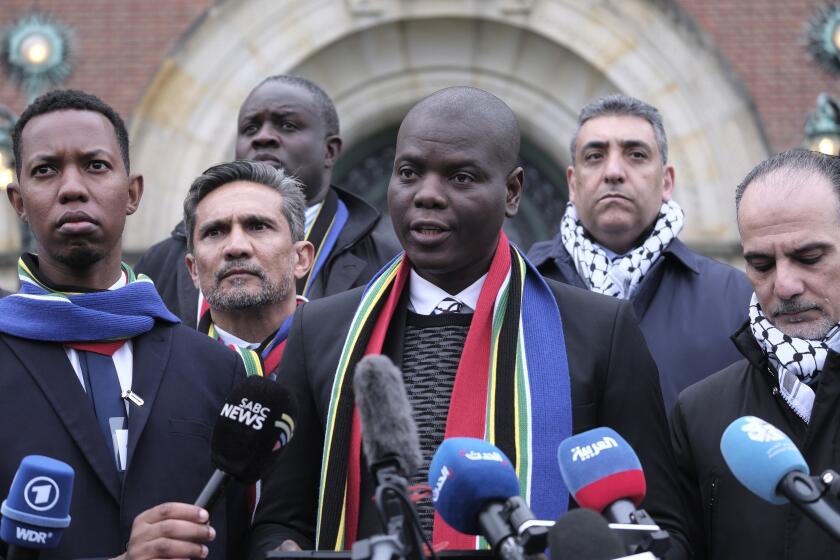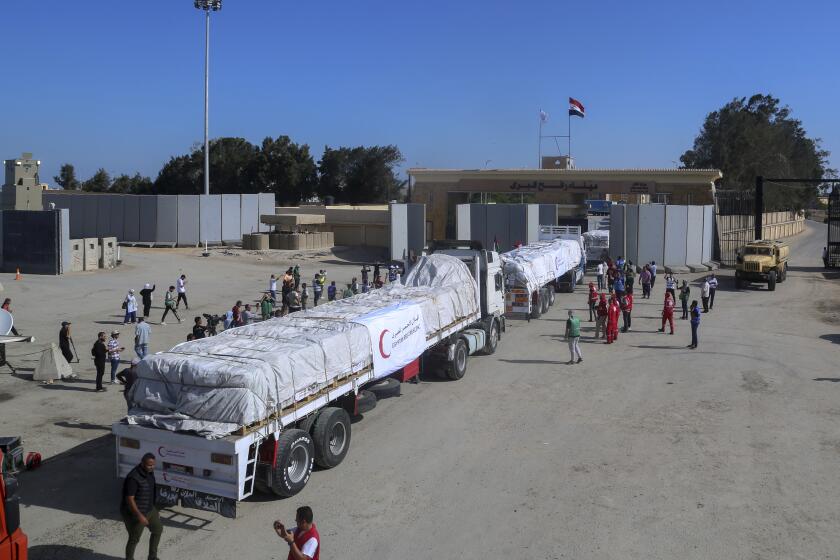Opinion: U.S. tax dollars should be funding humanitarian relief work in Gaza, not destroying it

Over the past five decades, American taxpayers have invested more than $7 billion to finance hundreds of projects in humanitarian relief and development in the Gaza Strip and the West Bank, all under the banner of “peacebuilding.” But the Biden administration is currently providing the weaponry that is killing the very people the government set out to help and is failing to protect the life-giving projects that American money created. In addition, the administration has now suspended funding to the United Nations Relief and Works Agency, the largest humanitarian group in Gaza, as 2 million Palestinians there face mass homelessness, famine and disease.
Civilians are pawns in the war in Gaza, yet humanitarian assistance has been made conditional, withheld or delivered according to political and military agendas.
We’ve spoken to a dozen humanitarian-aid colleagues who are retired senior staff from Amideast, Anera, CARE, Catholic Relief Services, Mercy Corps, Save the Children and World Vision. All of us managed or consulted on projects that the U.S. Agency for International Development funded in the Gaza Strip and the West Bank during the 1990s and 2000s. We helped to improve family and primary healthcare access; train professors in teaching strategies; build nursing colleges; enhance the agricultural food sector; make more effective use of scarce water resources; and support municipal and social services. Through our nongovernmental organizations, we also worked to increase employment opportunities and create the first internet network for Palestinian NGOs and academic institutions.
With 20,000 dead in Israel’s bombing of Gaza, we feel compelled to prove our humanity. We have been denied agency as a people.
We worked closely with the U.S. Embassy in Tel Aviv, the consulate in Jerusalem and USAID personnel on these initiatives. A key motivation driving all of us was the responsibility of the U.S. to reinforce the economic, social and cultural rights of the Palestinian people as part of its moral and legal commitment to regional peace and security. This is what we worked so hard to achieve — and it is what more than 1,000 current USAID staffers affirmed in November when they publicly called on President Biden to support a cease-fire.
In South Africa’s case, the court says it’s plausible that Israel is perpetrating genocide against Palestinians in Gaza.
For us, this daily destruction of Palestinian society is very personal. Throughout the decades of this conflict, we have always condemned physical, structural, sexual and cultural violence no matter its justification or its perpetrators. The vicious Hamas attack on Oct. 7 and the subsequent ferocious response by Israel in Gaza can only lead to intergenerational insecurity for Israel, the fracturing of Palestinian society and further postponement of the Palestinian right to self-determination in safety and security.
As of late January, most of what was produced with the help of development and relief assistance in Gaza has been destroyed. Ambulance drivers and medical technicians in Gaza’s hospitals were trained, only now to be killed where they work, which human rights groups say violates international humanitarian law. Hundreds of Palestinian academics were trained at American institutions so they might return to teach at Gaza universities. But now more than 100 Gaza academics have been killed, and the universities across the Gaza Strip, along with technological hardware supplied by the U.S. for educational purposes, have been destroyed. American taxpayers supported farmers to expand their productivity. Now extensive tracts of fields, crops, orchards and greenhouses have been bulldozed. Women’s empowerment projects have collapsed and many of the trained staff killed, while housing projects and sewage infrastructure have been leveled. Child disability, youth sports and other community projects no longer exist. The consequences of the siege have put Gaza in an “apocalyptic free fall,” as leaders of global humanitarian organizations described the situation last month.
Aid has served as a wedge against Hamas, and enabled Israel to shirk its obligations under international law to provide for the needs of the occupied population.
Both Democratic and Republican administrations promoted these USAID projects, funded by Americans and affirmed by Congress, because it showed a commitment to peace and was in the U.S. national interest. Now, without setting effective limits on violence in this war, the current U.S. administration’s policies are unraveling that mission. These decisions can only heighten cynicism about the actual intentions and credibility of the United States in providing any such aid for post-war redevelopment and whether, in the future, our investment may once again go up in smoke.
U.S. tax dollars need to be directed toward diplomacy to address the outstanding issues at the root of this conflict: the future of refugees, Gaza, the West Bank and Jerusalem. By prioritizing an immediate cease-fire and the funding of aid for Gaza through humanitarian organizations, the Biden administration could stem further devastation and support a future for both Palestinians and Israelis based on human dignity.
Bruce Stanley served as director for the West Bank and Gaza for Amideast. Jonathan Evans served as country representative for Jerusalem, West Bank and Gaza for Catholic Relief Services. Annie Foster served as country director, Palestinian Territories for Save the Children. The views expressed in this piece do not necessarily represent the organizations listed here.
More to Read
A cure for the common opinion
Get thought-provoking perspectives with our weekly newsletter.
You may occasionally receive promotional content from the Los Angeles Times.














